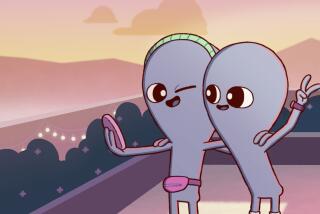Good Heavens! Can’t We Leave Poor Pluto Alone?
- Share via
Sure, Earth, you go right ahead. Pick on the littlest guy in the whole freakin’ solar system, why dontcha?
Just because you got a nice regular orbit, and mass and density to beat the band, you go and dump on the little guy, try to get him kicked out of the family. Badmouthing Pluto, putting it around that Pluto’s not even a real planet, only a planet-wannabe on the edge of the solar system.
And whaddya gonna say to those little kids, eh? They go to science class, they make a solar system thing outta pingpong balls and toothpicks, and you’re gonna go sayin’ Pluto isn’t even a planet, just some comet? What, next you gonna tell ‘em there’s no Santa Claus?
You wanna start pointin’ fingers? Fine. You ever look inna mirror, at the gorgeous planet Earth? Well, lemme tell you--you got ice. You got dirt. You got an ion tail. You better watch who you start callin’ a comet, because you could be next.
You wanna come after me now? OK, pal. Let’s step outside the galaxy. I’ll show you some stars you ain’t seen through that telescope of yours.
He wasn’t Darwin, he wasn’t Galileo, he was just Clyde Tombaugh, a high school graduate who became the only person in the 20th century to discover a planet--Pluto, out in the farthest suburbs of the solar system.
At least it was a planet by the scientific standards of 1930. And the country really needed a planet; it needed an American planet. The Times’ headline--”Greatest Feat in Century of Astronomy”--was a little effusive even then, but it was just a few months after the stock market crash that was the starter pistol for the Depression, and this Kansas farm boy at an observatory way out in Flagstaff, Arizona, finds a planet. What a country.
Pluto joined Mercury and Venus and sibling planets in bearing the name of an ancient god, the Greek lord of the underworld. Had it been named for the lord of the underworld today, we would be discussing Planet Corleone.
But astronomy changed. Telescopes changed. Definitions changed. Had Pluto been discovered today, it wouldn’t make the planet cut. It might be a comet, or a minor planet, the largest of the objects known as Plutinos--the backup band, not the lead singer.
Already the Hayden Planetarium in New York has plucked Pluto out of the heavens; “downgrade” is the word its director used. But the international commission on astronomical nomenclature insists that Pluto is still a planet in good standing.
Up at the Jet Propulsion Laboratory in Pasadena, where nobody is exactly at slide-rules drawn over this, Donald K. Yeomans is a senior research scientist and a whiz on small bodies in space. “A lot of people joke that Pluto is the only planet [in this solar system] we haven’t visited by spacecraft, and if we removed it as a planet, we could argue, ‘We’ve seen ‘em all, let’s close up shop and go home.”’
His basic argument is: “On purely scientific grounds, Pluto doesn’t have the right to be called a planet. . . . But I don’t think you can rewrite history; it’s been the ninth planet so long, you just can’t strip it of its status, for historical reasons.” And anyway, as Yeomans says, “we still don’t have a really good definition for a planet.”
What Yeomans does have is too many celestial objects--minor planets, asteroids. The solar system is lousy with ‘em. About 5,000 new ones keep turning up every month, and they’re running out of names. They’re named for dogs and cats, for restaurants, for the Beatles. Yeomans’ article “Killer Rocks and the Celestial Police” says it’s become a parlor game. Combine the names of five particular asteroids and you get “Rockefellia Edda Hamburga Inna Mercedes.”
I once spent time on a work-study program at JPL, where I corrected the spelling of “Ithaca” in a Carl Sagan film about the planet Mars, Ithaca being the town where Cornell University is found. That was the sum of my contribution to the space program. I plan to remedy that here.
Writers and poets: Submit your names for some of these plan-ettes. I will send them along to JPL.
NASA: If they can do it for sports stadiums, you can do it for pieces of rock billions of miles away. Sell the naming rights and fund your programs. You sure aren’t shaking any dough out of Congress.
And you people at Disney: You’ve got a stake in this too. Although a Disney spokesman told me loyally that “Pluto will always be a major character to us,” demoting Pluto could send shock waves through the small, tight, backbiting and sometimes competitive world of animated characters. What child wants an action figure, a burger-meal toy named after some crummy comet? If Dennis Tito can spend 20 million to go into space, you can spend a million on the campaign to keep Pluto in the family of planets. Consider it child’s play.
*
Patt Morrison’s column appears Mondays and Wednesdays. Her e-mail address is patt.morrison@latimes.com.
More to Read
Sign up for The Wild
We’ll help you find the best places to hike, bike and run, as well as the perfect silent spots for meditation and yoga.
You may occasionally receive promotional content from the Los Angeles Times.





